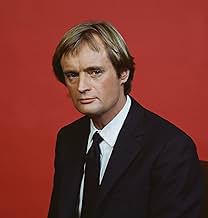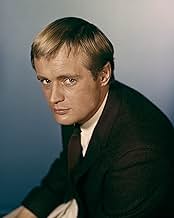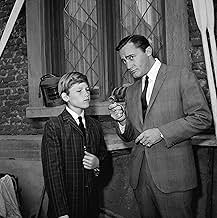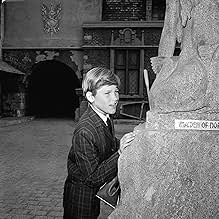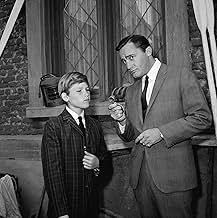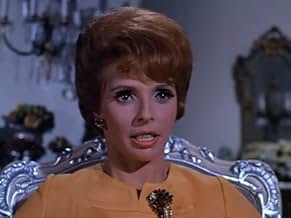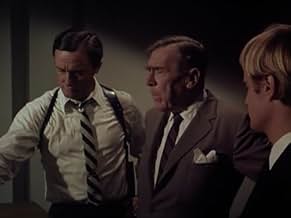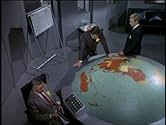El agente secreto de C.I.P.O.L.
Título original: The Man from U.N.C.L.E.
Los dos mejores agentes del Comando de la Red Unida para el Cumplimiento de la Ley (U.N.C.L.E.) luchan contra los enemigos de la paz, especialmente las fuerzas de T.H.R.U.S.H.Los dos mejores agentes del Comando de la Red Unida para el Cumplimiento de la Ley (U.N.C.L.E.) luchan contra los enemigos de la paz, especialmente las fuerzas de T.H.R.U.S.H.Los dos mejores agentes del Comando de la Red Unida para el Cumplimiento de la Ley (U.N.C.L.E.) luchan contra los enemigos de la paz, especialmente las fuerzas de T.H.R.U.S.H.
- Nominado a 16 premios Primetime Emmy
- 2 premios ganados y 23 nominaciones en total
Explorar episodios
Argumento
¿Sabías que…?
- TriviaRobert Vaughn worked on his Ph.D. during the course of the series and often was allowed to leave the set early so that he could attend night classes.
- ErroresThe map upon Mr. Waverly's office wall is incorrect in numerous cases. For example, it shows Canada and Newfoundland to be 2 separate states, which they were until 1949. Other errors include the lack of East Pakistan and all of Indo-China is depicted as one nation by the name of 'Siam'. This map appears in various episodes. East Pakistan was founded in the late 1940s, and Siam split up in the 1950s; Siam then became Thailand.
- Citas
Napoleon Solo: [calling on the intercom] Illya, we have a situation here that needs your special talents. Are you free?
Illya Kuryakin: [from intercom] No man is free who works for a living. But, I'm available.
- Créditos curiososA number of first-season episodes begin with a prologue in which the lead actors break the fourth wall and address the audience, explaining who they are and what they do.
- Versiones alternativasEvery two-part episodes of this series was re-edited for theatrical release in Europe. Each of these films include scenes filmed especially for theaters, often including additional violence or innuendo, while the TV versions also include scenes not released theatrically. These movies are listed separately in the IMDb.
- ConexionesFeatured in TV Guide: The First 25 Years (1979)
Opinión destacada
'The Man from U.N.C.L.E.' was an bona fide television phenomena when it first aired, in 1964. The brainchild of producer Norman Felton, who was a fan of Ian Fleming's 'James Bond' novels, the missions of the United Network Command for Law and Enforcement (U.N.C.L.E.), would be set on an international scale, pitted against SPECTRE-like THRUSH, an organization composed of terrorists, anarchists, and megalomaniacs. In the original concept, a 'civilian' would be drawn into the intrigue, each week, to aid U.N.C.L.E. on a mission, and provide a link that viewers could relate to.
Felton sent his notes to Ian Fleming, asking the author to create a name for the series' hero, and Fleming came up with 'Napoleon Solo', the last name 'lifted' from a gangster character from 'Goldfinger'. He offered a few other minor suggestions, and gave Felton his blessing on the endeavor. With a 'pedigree' like this, how could the series fail?
Veteran writer Sam Rolfe came on board to write the pilot script and co-produce, and an excellent cast was assembled. Oscar-nominee Robert Vaughn, who'd worked with Felton on the series, 'The Lieutenant', was cast as Solo; young Scot actor David McCallum, fresh from THE GREAT ESCAPE, would play the supporting role of fellow agent Illya Kuryakin; and, in a casting coup, legendary character actor Leo G. Carroll, who'd portrayed a spy chief in Alfred Hitchcock's NORTH BY NORTHWEST, would assume the same function for U.N.C.L.E. (Getting Carroll required some creativity; while his 'official' birth date was listed as 1892, he was actually born in 1887, and NBC would never have permitted a nearly 80-year old series regular...Felton stuck with '1892', and made his scenes as easy as possible, which worked, as Carroll survived the entire series' run, not passing away until 1972).
Shot in black and white for the first season, and featuring a marvelous 'bulletproof glass' opening sequence, with a majestic, John Barry-influenced theme (by Jerry Goldsmith), 'U.N.C.L.E.' debuted in 1964 as both FROM Russia WITH LOVE and GOLDFINGER were in theaters, and soon became a major hit...then reached unprecedented heights, when McCallum, with his 'Beatles'-like haircut, captured the attention of younger fans caught up with the 'British Invasion' of Rock music, and became an overnight sex symbol nationwide. McCallum's role was quickly 'beefed-up' to co-star status, and U.N.C.L.E.-mania had begun!
With a terrific mix of action, tongue-in-cheek humor, and what NBC would allow for sex, the first season offered many memorable moments, including the first appearance of future 'Star Trek' stars William Shatner and Leonard Nimoy, together, in an episode (Shatner was the heroic 'civilian' called in to aid U.N.C.L.E., Nimoy was the villain's henchman).
NBC was very pleased with their hit series, and Vaughn and McCallum were soon doing 'cameos' in other series, as well as promotions for the Peacock Network. One of the first 'primetime' series to be extensively marketed, a line of U.N.C.L.E. merchandise appeared, with dolls, toy guns, lunch boxes, comic books, model kits, cologne, clothing, and more filling store shelves. It was a heady time for everyone!
For the second season (1965-66), 'U.N.C.L.E.' was produced in color, and a 'guest' list of legendary stars lined up for appearances on the series, but despite respectable ratings, the overall quality of the show fluctuated, with some episodes downright silly. Just as the 'Bond' films peaked in popularity in 1965, with THUNDERBALL, then began to decline as the 'craze' subsided, the novelty of 'U.N.C.L.E.' began to wear off, and new 'line' producers were more interested in comedy and campiness, discarding, by season's end, any 'edge' the series first had. By the third season (1966-67), 'camp' was the rule; a spin-off, 'The Girl from U.N.C.L.E.', flopped; and the writing was on the wall that the series was on it's way out.
The producers made a last-ditch attempt to return the more dramatic elements to the series at the start of it's fourth season, in 1967, discarding the campiness, and, unfortunately, nearly all of the humor, as well, but the newly 'serious' 'U.N.C.L.E.' had lost it's audience, and the show was canceled in early 1968.
The impact of 'The Man from U.N.C.L.E.' cannot be minimized. It paved the way for 'The Wild, Wild, West', 'Get Smart', 'Mission Impossible', and all the other 'spy' shows that followed in it's footsteps, became a 'cult' favorite after cancellation that is still generating interest, to this day (with successful conventions, a 'reunion' TV-movie, and a steady stream of fan mail continuing to be sent to Vaughn and McCallum, 35 years after the final episode first aired), and there is talk of a feature film in the works.
And, as we fans will always remember, without the cooperation of the United Network Command for Law and Enforcement, none of this would be possible!
Felton sent his notes to Ian Fleming, asking the author to create a name for the series' hero, and Fleming came up with 'Napoleon Solo', the last name 'lifted' from a gangster character from 'Goldfinger'. He offered a few other minor suggestions, and gave Felton his blessing on the endeavor. With a 'pedigree' like this, how could the series fail?
Veteran writer Sam Rolfe came on board to write the pilot script and co-produce, and an excellent cast was assembled. Oscar-nominee Robert Vaughn, who'd worked with Felton on the series, 'The Lieutenant', was cast as Solo; young Scot actor David McCallum, fresh from THE GREAT ESCAPE, would play the supporting role of fellow agent Illya Kuryakin; and, in a casting coup, legendary character actor Leo G. Carroll, who'd portrayed a spy chief in Alfred Hitchcock's NORTH BY NORTHWEST, would assume the same function for U.N.C.L.E. (Getting Carroll required some creativity; while his 'official' birth date was listed as 1892, he was actually born in 1887, and NBC would never have permitted a nearly 80-year old series regular...Felton stuck with '1892', and made his scenes as easy as possible, which worked, as Carroll survived the entire series' run, not passing away until 1972).
Shot in black and white for the first season, and featuring a marvelous 'bulletproof glass' opening sequence, with a majestic, John Barry-influenced theme (by Jerry Goldsmith), 'U.N.C.L.E.' debuted in 1964 as both FROM Russia WITH LOVE and GOLDFINGER were in theaters, and soon became a major hit...then reached unprecedented heights, when McCallum, with his 'Beatles'-like haircut, captured the attention of younger fans caught up with the 'British Invasion' of Rock music, and became an overnight sex symbol nationwide. McCallum's role was quickly 'beefed-up' to co-star status, and U.N.C.L.E.-mania had begun!
With a terrific mix of action, tongue-in-cheek humor, and what NBC would allow for sex, the first season offered many memorable moments, including the first appearance of future 'Star Trek' stars William Shatner and Leonard Nimoy, together, in an episode (Shatner was the heroic 'civilian' called in to aid U.N.C.L.E., Nimoy was the villain's henchman).
NBC was very pleased with their hit series, and Vaughn and McCallum were soon doing 'cameos' in other series, as well as promotions for the Peacock Network. One of the first 'primetime' series to be extensively marketed, a line of U.N.C.L.E. merchandise appeared, with dolls, toy guns, lunch boxes, comic books, model kits, cologne, clothing, and more filling store shelves. It was a heady time for everyone!
For the second season (1965-66), 'U.N.C.L.E.' was produced in color, and a 'guest' list of legendary stars lined up for appearances on the series, but despite respectable ratings, the overall quality of the show fluctuated, with some episodes downright silly. Just as the 'Bond' films peaked in popularity in 1965, with THUNDERBALL, then began to decline as the 'craze' subsided, the novelty of 'U.N.C.L.E.' began to wear off, and new 'line' producers were more interested in comedy and campiness, discarding, by season's end, any 'edge' the series first had. By the third season (1966-67), 'camp' was the rule; a spin-off, 'The Girl from U.N.C.L.E.', flopped; and the writing was on the wall that the series was on it's way out.
The producers made a last-ditch attempt to return the more dramatic elements to the series at the start of it's fourth season, in 1967, discarding the campiness, and, unfortunately, nearly all of the humor, as well, but the newly 'serious' 'U.N.C.L.E.' had lost it's audience, and the show was canceled in early 1968.
The impact of 'The Man from U.N.C.L.E.' cannot be minimized. It paved the way for 'The Wild, Wild, West', 'Get Smart', 'Mission Impossible', and all the other 'spy' shows that followed in it's footsteps, became a 'cult' favorite after cancellation that is still generating interest, to this day (with successful conventions, a 'reunion' TV-movie, and a steady stream of fan mail continuing to be sent to Vaughn and McCallum, 35 years after the final episode first aired), and there is talk of a feature film in the works.
And, as we fans will always remember, without the cooperation of the United Network Command for Law and Enforcement, none of this would be possible!
- cariart
- 10 dic 2003
- Enlace permanente
Selecciones populares
Inicia sesión para calificar y agrega a la lista de videos para obtener recomendaciones personalizadas
Detalles
- Tiempo de ejecución50 minutos
- Color
Contribuir a esta página
Sugiere una edición o agrega el contenido que falta

Principales brechas de datos
What is the Hindi language plot outline for El agente secreto de C.I.P.O.L. (1964)?
Responda

